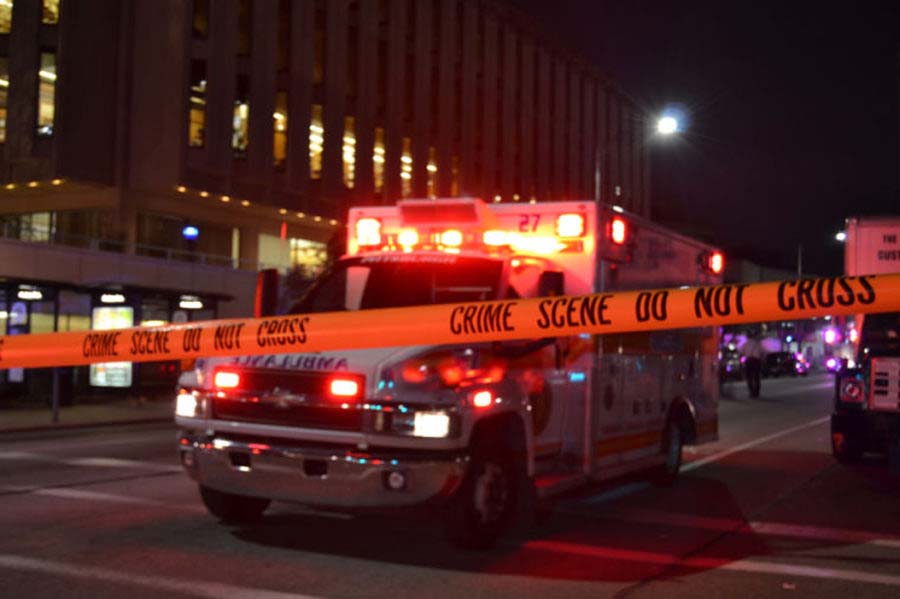911 operators call on each other for support


According to Don Sand, division chief of 911 operations at the Allegheny County Police Department, 911 operator shifts can last anywhere from eight to 16 hours, and operators can receive up to 4,200 calls per day.
For 911 operators, every call is just as important as the last.
According to Don Sand, division chief of 911 operations for the Allegheny County Police Department, operators must treat every call with the same amount of preparedness.
“A 911 operator never knows what is going on on the other side,” Sand said.
On the operator’s side, there is a strict procedure they have to follow for each call, from providing instructions for emergency medical intervention to dispatching local emergency service personnel. But while operators remain calm on the line, the trauma they negotiate in each call can translate to psychological stress away from the job, Sand said.
During the 8- to 16-hour shifts, Sand said, operators receive up to 4,200 calls with varying degrees of crisis. It’s the job of the operator to ensure the caller remains as calm as possible, keeping a neutral tone and slowly giving instruction.
Sheila Roth, the program director for the master’s in social work at Carlow University, works with 911 operators affected by the trauma and stress that comes with their job.
“[Operators] solve problems,” Roth said. “It’s what they do. First responders by nature are problem solvers who are action-oriented, self-contained and use emotional constriction to do their jobs.”
This comes with a price, Roth said, with first responders having a high risk of absorbing their patients’ stress.
“First responders may be at a higher risk for psychological trauma because of recurring, daily critical incidents within one shift or a few weeks,” Roth said.
To combat these negative effects, Roth said, first responders and 911 operators are encouraged to attend Employee Assistance Programs that provide counseling and resources to the employees as well as their families.
“In the Pittsburgh region, we have been working to educate first responders about self-care and to link them to resources that can help them to deal with difficult calls,” Roth said.
According to Roth, one of the most effective forms of EAPs for first responders is peer support groups. These groups allow emergency service employees with similar work environments to reach out to their fellow coworkers and confide in each other, helping out in whatever ways they can.
“These peers are individuals who are already trusted and looked to for support from colleagues within the organization, the ‘natural helpers,’” Roth said.
According to Roth, the peer groups can help educate workers on confidentiality, crisis response and suicide awareness. Helping bridge the gap by educating first responders and creating a healthy work environment that supports its employees, Roth said, is the purpose of such a support group.
“In addition, these peer groups have come together to develop and host multiple symposiums for first responders covering the topics of critical incident stress, suicide awareness and self-care,” Roth said.
The emotional aspect of the job is extended in the university setting, according to Josie Fajerski, a communications specialist with Pitt Public Safety. It is Fajerski’s job to dispatch local emergency services to the scene of a crisis after operators receive their calls.
“I feel my role is not only that of a dispatcher but sometimes being a surrogate friend, one that the parents can put trust in that their children are being cared for and looked after as if they were our own,” Fajerski said.
According to Fajerski, the freedom and responsibility that is handed to college students can be quite frightening, especially since the University is in the heart of the City. Working in a team with several other officers and safety specialists helps ensure that security will be regulated and campus safety will be enforced.
“Everyone pulls together to help each other out,” Fajerski said. “This helps minimize the stress that one person endures. Not only are we dedicated to helping the Pitt community — its students, family, friends and employees — but we are also dedicated to each other.”
Recent Posts
Who Asked? // Do we really get a summer vacation?
This installment of Who Asked? by staff writer Brynn Murawski mourns the seemingly impossible perfect…
Notes From an Average Girl // Notes from my junior year
In this edition of Notes From an Average Girl, senior staff writer Madeline Milchman reflects…
Meaning at the Movies // The Power of the Movie Theater
In this edition of “Meaning at the Movies,” staff writer Lauren Deaton discusses her love…
EMBRACE sponsors Black Maternal Health Wellness week
Because Black women’s maternal health is not institutionally prioritized, Pitt’s EMBRACE sponsored a Black Maternal…
Local ‘Standing Wave’ coffee truck energizes the Pitt food scene
The small business coffee truck “Standing Wave” has become a beloved new coffee spot on…
Editorial | A free world demands a free press
After years working as student editors, they have learned a lot about the challenges and…

